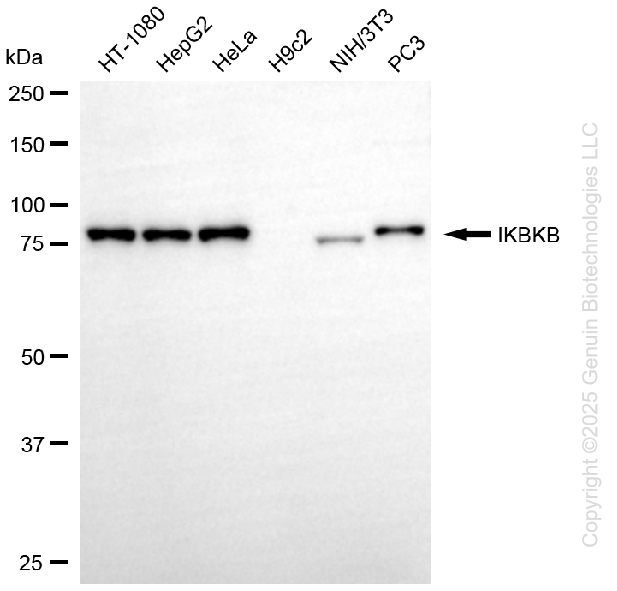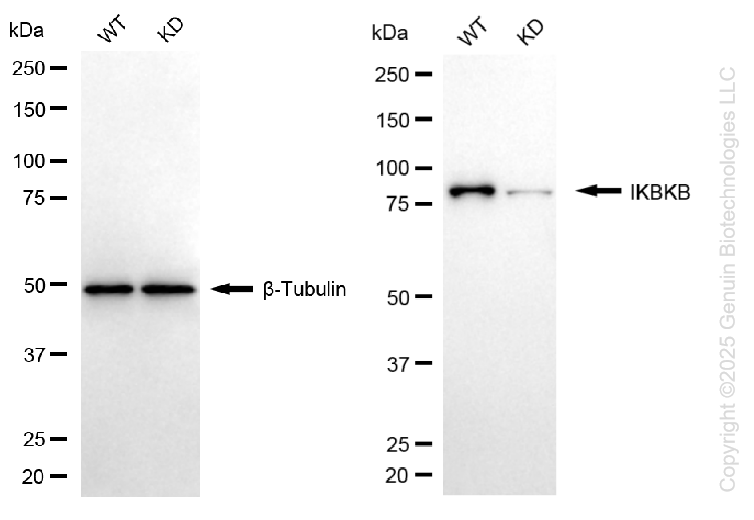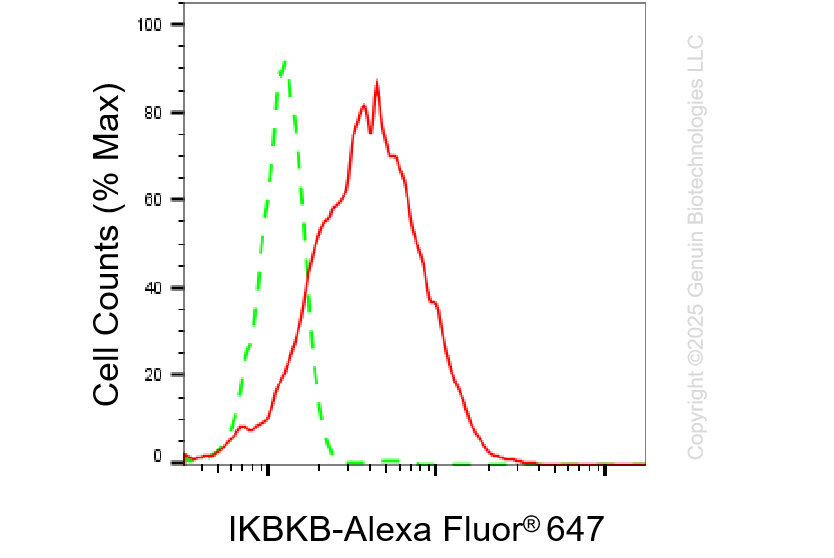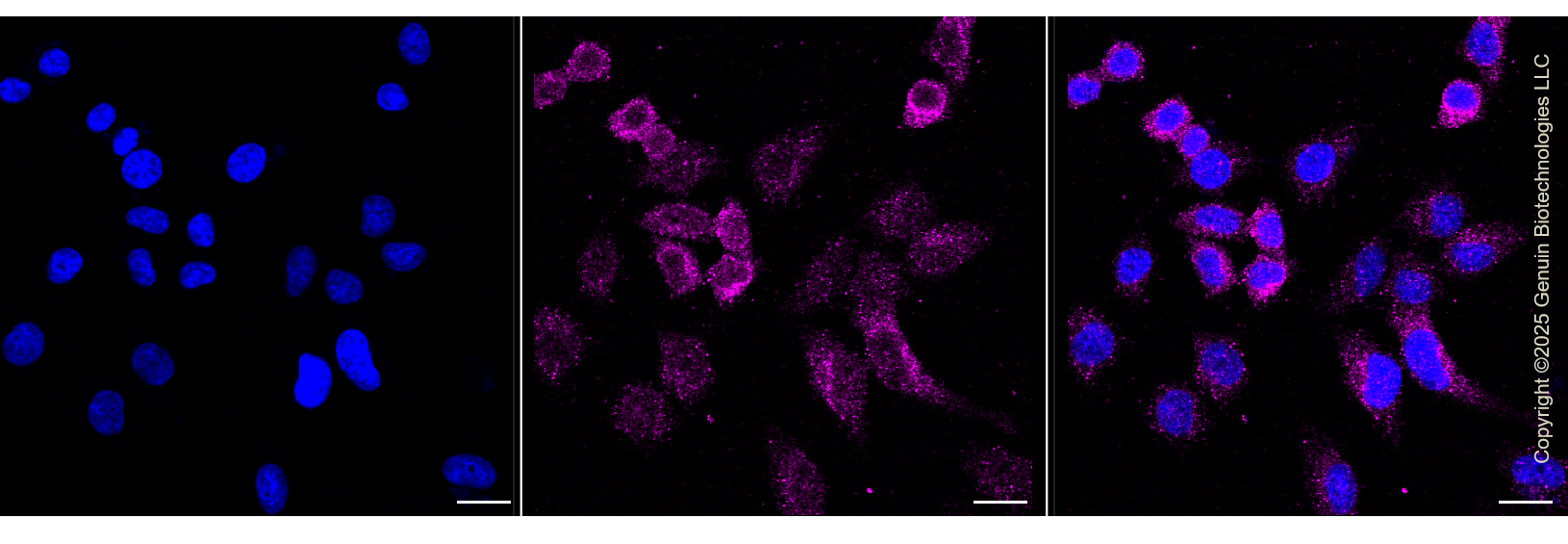KD-Validated Anti-IKBKB Rabbit Monoclonal Antibody
Rabbit monoclonal antibody
- SPECIFICATION
- CITATIONS
- PROTOCOLS
- BACKGROUND

Application
| WB, FC, ICC |
|---|---|
| Primary Accession | O14920 |
| Reactivity | Human, Mouse |
| Clonality | Monoclonal |
| Isotype | Rabbit IgG |
| Clone Names | 25GB2895 |
| Calculated MW | Predicted, 87 kDa; observed, 87 kDa |
| Gene Name | IKBKB |
| Aliases | IKBKB; Inhibitor Of Nuclear Factor Kappa B Kinase Subunit Beta; IKK-Beta; NFKBIKB; IKK2; IKKB; Inhibitor Of Kappa Light Polypeptide Gene Enhancer In B-Cells, Kinase Beta; Inhibitor Of Nuclear Factor Kappa-B Kinase Subunit Beta; Nuclear Factor NF-Kappa-B Inhibitor Kinase Beta; Serine/Threonine Protein Kinase IKBKB; I-Kappa-B-Kinase Beta; I-Kappa-B Kinase 2; EC 2.7.11.10; IKK-2; Nuclear Factor Kappa B Kinase Subunit Beta; EC 2.7.11.1; EC 2.7.11; IMD15A; IMD15B; IMD15; IKK-B; IkBKB |
| Immunogen | A synthesized peptide derived from human IKK beta |
| Gene ID | 3551 |
|---|---|
| Other Names | Inhibitor of nuclear factor kappa-B kinase subunit beta, I-kappa-B-kinase beta, IKK-B, IKK-beta, IkBKB, 2.7.11.10, I-kappa-B kinase 2, IKK-2, IKK2, Nuclear factor NF-kappa-B inhibitor kinase beta, NFKBIKB, Serine/threonine protein kinase IKBKB, 2.7.11.1, IKBKB, IKKB |
| Name | IKBKB |
|---|---|
| Synonyms | IKKB |
| Function | Serine kinase that plays an essential role in the NF-kappa-B signaling pathway which is activated by multiple stimuli such as inflammatory cytokines, bacterial or viral products, DNA damages or other cellular stresses (PubMed:20434986, PubMed:20797629, PubMed:21138416, PubMed:30337470, PubMed:9346484). Acts as a part of the canonical IKK complex in the conventional pathway of NF-kappa-B activation (PubMed:9346484). Phosphorylates inhibitors of NF-kappa-B on 2 critical serine residues (PubMed:20434986, PubMed:20797629, PubMed:21138416, PubMed:9346484). These modifications allow polyubiquitination of the inhibitors and subsequent degradation by the proteasome (PubMed:20434986, PubMed:20797629, PubMed:21138416, PubMed:9346484). In turn, free NF-kappa-B is translocated into the nucleus and activates the transcription of hundreds of genes involved in immune response, growth control, or protection against apoptosis (PubMed:20434986, PubMed:20797629, PubMed:21138416, PubMed:9346484). In addition to the NF-kappa-B inhibitors, phosphorylates several other components of the signaling pathway including NEMO/IKBKG, NF-kappa-B subunits RELA and NFKB1, as well as IKK-related kinases TBK1 and IKBKE (PubMed:11297557, PubMed:14673179, PubMed:20410276, PubMed:21138416). IKK-related kinase phosphorylations may prevent the overproduction of inflammatory mediators since they exert a negative regulation on canonical IKKs (PubMed:11297557, PubMed:20410276, PubMed:21138416). Phosphorylates FOXO3, mediating the TNF-dependent inactivation of this pro-apoptotic transcription factor (PubMed:15084260). Also phosphorylates other substrates including NAA10, NCOA3, BCL10 and IRS1 (PubMed:17213322, PubMed:19716809). Phosphorylates RIPK1 at 'Ser-25' which represses its kinase activity and consequently prevents TNF- mediated RIPK1-dependent cell death (By similarity). Phosphorylates the C-terminus of IRF5, stimulating IRF5 homodimerization and translocation into the nucleus (PubMed:25326418). Following bacterial lipopolysaccharide (LPS)-induced TLR4 endocytosis, phosphorylates STAT1 at 'Thr-749' which restricts interferon signaling and anti-inflammatory responses and promotes innate inflammatory responses (PubMed:38621137). IKBKB-mediated phosphorylation of STAT1 at 'Thr-749' promotes binding of STAT1 to the ARID5A promoter, resulting in transcriptional activation of ARID5A and subsequent ARID5A-mediated stabilization of IL6 (PubMed:32209697). It also promotes binding of STAT1 to the IL12B promoter and activation of IL12B transcription (PubMed:32209697). |
| Cellular Location | Cytoplasm. Nucleus. Membrane raft. Note=Colocalized with DPP4 in membrane rafts. |
| Tissue Location | Highly expressed in heart, placenta, skeletal muscle, kidney, pancreas, spleen, thymus, prostate, testis and peripheral blood |

Thousands of laboratories across the world have published research that depended on the performance of antibodies from Abcepta to advance their research. Check out links to articles that cite our products in major peer-reviewed journals, organized by research category.
info@abcepta.com, and receive a free "I Love Antibodies" mug.
Provided below are standard protocols that you may find useful for product applications.
If you have used an Abcepta product and would like to share how it has performed, please click on the "Submit Review" button and provide the requested information. Our staff will examine and post your review and contact you if needed.
If you have any additional inquiries please email technical services at tech@abcepta.com.














 Foundational characteristics of cancer include proliferation, angiogenesis, migration, evasion of apoptosis, and cellular immortality. Find key markers for these cellular processes and antibodies to detect them.
Foundational characteristics of cancer include proliferation, angiogenesis, migration, evasion of apoptosis, and cellular immortality. Find key markers for these cellular processes and antibodies to detect them. The SUMOplot™ Analysis Program predicts and scores sumoylation sites in your protein. SUMOylation is a post-translational modification involved in various cellular processes, such as nuclear-cytosolic transport, transcriptional regulation, apoptosis, protein stability, response to stress, and progression through the cell cycle.
The SUMOplot™ Analysis Program predicts and scores sumoylation sites in your protein. SUMOylation is a post-translational modification involved in various cellular processes, such as nuclear-cytosolic transport, transcriptional regulation, apoptosis, protein stability, response to stress, and progression through the cell cycle. The Autophagy Receptor Motif Plotter predicts and scores autophagy receptor binding sites in your protein. Identifying proteins connected to this pathway is critical to understanding the role of autophagy in physiological as well as pathological processes such as development, differentiation, neurodegenerative diseases, stress, infection, and cancer.
The Autophagy Receptor Motif Plotter predicts and scores autophagy receptor binding sites in your protein. Identifying proteins connected to this pathway is critical to understanding the role of autophagy in physiological as well as pathological processes such as development, differentiation, neurodegenerative diseases, stress, infection, and cancer.





